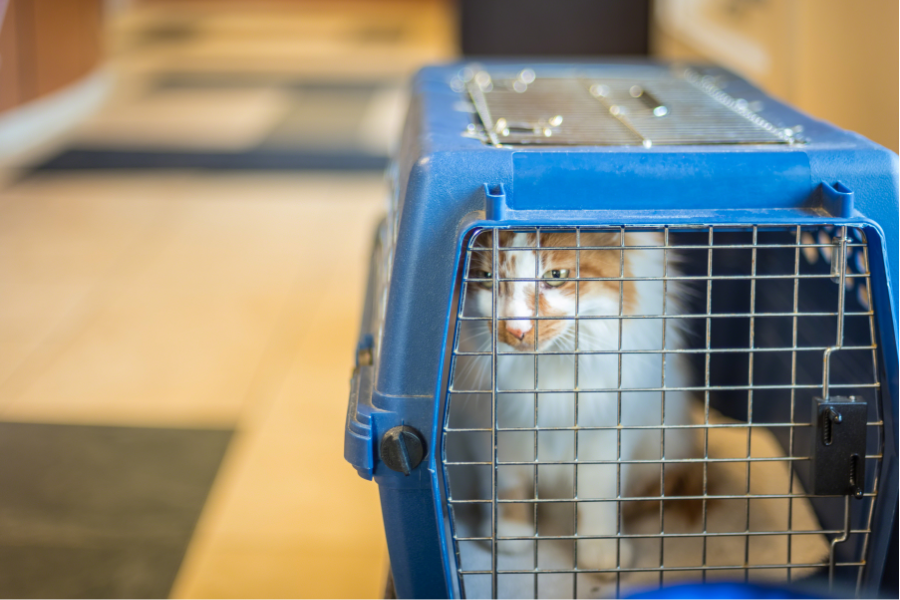Must-Know Tips for a Military Move to Japan
If you have orders to Japan, you may not know where to begin. Moving to Japan comes with some hoops to jump through, but remember, many military families have been in your shoes.
Keep your focus on the positive side of moving to Japan. This location is so loved by military families who've lived there that it's common for families to request extensions or ask for orders to return overseas.
A smooth transition to Japan is possible, but you'll need to put your organizational and time management skills to work! Here's where to start with your PCS move to Japan.
 In this post:
In this post:
- Gather Official Documents and Shipments
- Connecting With Your Overseas Sponsor
- Bringing Your Pet to Japan
- Lodging and Transportation in Japan
- Military Spouse Life in Japan
- Be Familiar with Cultural Differences
- Understand Island vs. Mainland Living
- Japan Resources to Explore
- Japan Travel Tips
- Everyday Life in Japan
Gather Official Documents and Shipments
There's a lot of paperwork involved in moving to Japan from the U.S. While the service member should receive a comprehensive list from their command, there are a few things you can work ahead on.
Current Tourist Passports
If your passport expires while living overseas, you should still be able to renew via the consulate. The tourist passport is vital for leisure travel around the Pacific or back to the U.S. if you’re traveling without orders.
No-Fee Passports
Bring a completed application, passport photos, and a copy of your orders. The no-fee passport is required for a PCS move to and from Japan but is not to be used for leisure travel.
Pet Importation
If you're traveling with a pet, gather the necessary documentation: rabies certificates, the FAVN test, health certificates, and more. Read more about importing your pets to Japan below.
Overseas Health Screening
A health screening for all family members is required for a PCS to Japan. This ensures that the healthcare facilities accepting you have the necessary resources to meet your medical needs.
Vaccines
There is a list of required vaccines before moving to Japan (JEV and Typhoid are non-standard for the U.S.). You'll need to provide proof of necessary vaccines and schedule immunizations for the ones you don’t yet have. While the medical facilities insist that JEV and typhoid are mandatory, they are not for dependents—utilize discretion.
Shipments
You should be allowed three shipments for your belongings: household goods, non-temporary storage, and express. Start thinking through which items will go where to avoid chaos during your pack-outs. There is an art to planning for these three shipments.
If you’re unsure which items are worth bringing to Japan, your sponsor can probably help you decide what items will be most practical.
 Photo from Canva
Photo from Canva
Connecting with Your Overseas Sponsor
Your overseas sponsor is your lifeline. If you’ve never used a sponsor for a military move, now is the time. If you’re uncertain how a sponsor can help ease your stress, follow this Checklist for An Overseas Sponsor.
Sponsors have a wealth of knowledge and will help you get established. From securing your temporary lodging to picking you up from the airport, chauffeuring you to the welcome brief, securing an APO/FPO address, and more, they are an essential part of your PCS to Japan.
Your sponsor will also advise you about housing and can help you navigate the process before you arrive.
Bringing Your Pet to Japan
Moving with a pet to Japan is a serious business. Japan is rabies-free and has strict requirements regarding pet importation, mandating 180-day quarantines after the FAVN test and rabies vaccinations before arrival. The process is time-consuming and requires preparation if you want to avoid quarantine upon arrival.
For more information on moving your pet to Japan, view the Import Guide.
 Photo from Canva
Photo from Canva
Lodging and Transportation in Japan
It might feel like you're alone in your Japan journey, but the reality is that thousands of military members transfer in and out of the country each year, which means a tight squeeze on facilities like lodging, especially if you have a pet to consider.
Your sponsor can help secure lodging. The earlier, the better, as it's much easier to shift dates under an existing reservation than to be denied because the facility is at capacity.
Want to lessen your mental load? Leave your car at home. Sell or store it with a friend who can start the engine occasionally. Bringing your vehicle is often not allowed and is also unrealistic in Japan. Don’t forget that people drive on the left side of the road.
Resale pages and "lemon lots" are filled with reliable and ready-to-roll cars to buy. It’s a thing in Japan. Most people buy what they need and sell to the next military family before they PCS back to the States. If you plan to drive overseas, you need a base-issued Japanese driver’s license, and your U.S. license must be current. Photo from Canva
Photo from Canva
Military Spouse Life in Japan
Networks help enhance the Japanese experience. Even if you don’t usually participate in your spouse’s workgroups or activities, they're an essential resource overseas. You’ll need a support system to conquer the inevitable family emergencies during a TDY or deployment.
Volunteering on base is a great way to find a supportive community to help find your footing. Not only is surrounding yourself with like-minded spouses the quickest way to feel less homesick, but it’s also a great way to network for future job opportunities.
If you plan to work during your time in Japan, explore the possibilities before leaving. Jobs in Japan can be difficult to find, but those with remote work options or teaching and nursing credentials tend to fare better than most
 Soldiers from Public Health Activity-Japan, Okinawa Branch, Japan, volunteer at a local preschool in Yomitan, Okinawa. Image via army.mil.
Soldiers from Public Health Activity-Japan, Okinawa Branch, Japan, volunteer at a local preschool in Yomitan, Okinawa. Image via army.mil.
Be Familiar with Cultural Differences
Military families stationed in Japan often comment on how kind and helpful local citizens are. But realize there is some local discontentment about American military bases located there. Respect for Japanese citizens and their culture goes a long way in bridging the gap.
Some major differences:
- The Japanese community is more modest and conservative than Americans. They are not loud or boisterous and do their tasks quietly. You won’t hear music playing in the car next to you or see trash on the road. They are very respectful of their community spaces and everyone around them.
- They love children. They are patient and loving toward kids, and it’s not uncommon for them to offer to hold your crying baby while you finish your meal at a restaurant.
- It’s generally safe. Japan is an incredible place to raise young children and foster independence.
 Photo from Canva
Photo from Canva
Understand Island vs. Mainland Living
While preparing to PCS to Japan, military members often overlook the differences between living in mainland Japan or Okinawa. It’s common for newcomers to bundle all Japanese references into one collection. But those familiar with both locations will tell you there are significant cultural differences, especially in cuisine.
Mainland Japan duty stations most closely resemble Japanese city life with easy-to-access public transportation. Families enjoy four distinct seasons and take advantage of season-specific activities such as viewing the cherry blossoms in the spring, hiking to waterfalls in the summer, and skiing in winter.
Okinawa is quintessential island life, with hot temperatures and humidity nearly all year and frequent typhoon activity in the summertime. Snorkeling, scuba diving, and beach activities are unparalleled. The pace of life is casual and somewhat Americanized due to the saturation of the military population.

Image from 全家FamilyMart Facebook Page
Japan Resources to Explore
Don’t let nervousness at the unfamiliar keep you from trying new dishes and places to eat. Pop open Google Translate and attempt something new. Family Mart and Lawsons are the perfect stops to try local favorites.
There are many online resources to navigate Japan. Even if social media is not your favorite, Facebook is crucial during your time overseas.
Here are some great groups to follow:
- Okinawa Hai
- Okinawa Living
- Okinawa Pin Drops
- Okinawa Typhoon Prep
- Iwakuni Spouses
- Iwakuni Classifieds and Information
- Yokosuka SOFA Members
- Yokota Community
- Yokota Spouses’ Club
- Atsugi Community Resource Page
- Atsugi Neighborhood Resource and Guide
- Sasebo Classifieds
 Photo from Canva
Photo from Canva
Japan Travel Tips
One of the biggest perks of being stationed in Japan is accessibility to incredible travel destinations and exciting hobbies. But remember: travel on your tourist passport, not your military (no fee) passport.
Take advantage of Space-A flights out of Futenma, Iwakuni, Atsugi, and Yokota. These flights help you travel between mainland Japan, Okinawa, South Korea, Thailand, the Philippines, and Guam with ease.
The Okinawan coast offers world-class scuba diving. Many families get certified while cooped up in lodging as they wait on permanent housing and continue this exciting hobby throughout their time on the island.
Seek adventures through the ITT on base, as they do the hard work of navigating foreign routes and language translation for you. After you’ve become more acclimated, adventuring on your own will come naturally.
Hiking Mount Fuji is a once-in-a-lifetime event (unless you PCS to Japan again!), and military families highly recommend it.
Public transportation on mainland Japan is an amazing resource—so amazing that people frequently use trains or bikes instead of driving to their destinations.
Ask to join the Tips for Asia Travel Facebook page. The community helps guide military families living and playing in the region. More than likely, you’ll find the answers to any of your travel questions there. Photo from Canva
Photo from Canva
Tips for Everyday Life in Japan
While Japan is an exciting place to get stationed, it requires some adjusting.
These tips will help ease the transition:
- Much of the base housing is cinder blocks. Pack wall hangers and command strips, as screws and nails may not be usable.
- Spouses recommend shipping and packing any favorite store-brand item that makes life comfortable, but Amazon does the job for much of what you’ll need and cannot find in local stores.
- Save the new furniture for when you return to the U.S. The shipping process is rough on furniture, and damage caused by mold is a common problem.
- Military housing is short on adequate lighting. Lamps of all styles brighten up the rooms.
- Outdoor living amenities such as beach chairs, large play equipment, and patio furniture are expensive and rarely found.
- Although there are different voltages (the voltage in Japan is typically 110, and in the U.S. 120), most of your appliances will work, but your curling iron might not get as hot as you are used to back home.
- Plan for the holiday festivities that are important to your family. If you ask anyone in the spouse community in the Pacific, you’ll learn that holiday decorations are scarce. Most spouses recommend you bring these items with you even though space is tight.
While a military move to Japan can pose challenges and changes, most military families will tell you it's worth the effort. You'll make life-long memories and countless adventures. And the intoxicating Japanese culture will stay with you!
For more information about your overseas move, grab our free resource below.





